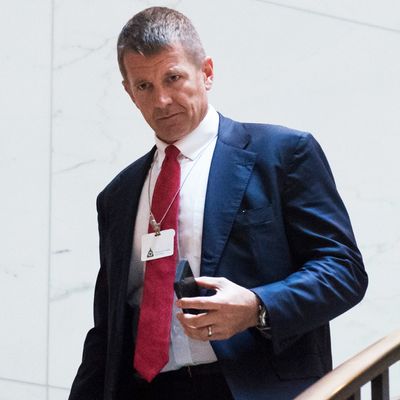
Remember Blackwater Security? Iraqis do. In September 2007, the company’s mercenary fighters killed 17 civilians in Baghdad’s Nisour Square. Blackwater has changed names twice since the Nisour Square murders — it was known, briefly, as XE Services and is now called Academi — but it endures. The company’s founder, Erik Prince, has no official role with Academi, which means that he too must find new ways to remain relevant. A mercenary leader in want of a new source of profit needs allies in government, and for a while, President Donald Trump looked like a sure meal ticket. Prince’s sister, Betsy DeVos, is Trump’s secretary of Education, and Prince himself occupied a murky advisory role with the transition team.
The nature of that role just became a bit more clear. Robert Mueller’s two-year-long investigation into the Russian government’s efforts to interfere with the results of the 2016 presidential election swept up Prince, too. In 2017, as the House Intelligence Committee investigated the possibility that the Trump administration sought a communications back channel with the Russian government, Prince testified that he met with Kirill Dmitriev, the head of the Russian Direct Investment Fund, in the Seychelles. He characterized that meeting as an impromptu encounter that occurred during an unrelated business trip, as Vox reported at the time. “I didn’t fly there to meet any Russian guy,” he told lawmakers.
But Mueller’s report, which was released in redacted form on Thursday, seems to contradict Prince’s version of events. By the time Prince met with Dmitriev, he’d already discussed the Russian businessman with George Nader, a convicted pedophile who’d reached out to members of the Trump inner circle as an emissary for Gulf states. Nader told Prince at the time that the Russians “were looking to build a link with the incoming Trump administration,” as the report put it, and sent Prince the Russian businessman’s bio along with a list of his “positive quotes about Donald Trump.” Prince went to Trump Tower the following day, and cell phone records indicate that he remained there for at least three hours, though he says he “could not recall” if he discussed Dmitriev with Steve Bannon or other members of the transition team.
But on January 7, 2017, Prince purchased a ticket to the Seychelles, where Nader was staying. On the 8th, Nader wrote to Dimitriev to tell him that he had “arranged” for Dmitriev to meet a member of the Trump transition team, a reference that, according to the report, applied to Prince. “According to Nader, Prince had led him to believe that Bannon was aware of Prince’s upcoming meeting with Dmitriev, and Prince acknowledged that it was fair for Nader to think that Prince would pass information on to the Transition Team,” the report continues. Dmitriev traveled to the Seychelles at Nader’s invitation and, on January 11, Prince met with Dmitriev.
As the report describes it, Prince’s meeting with Dmitriev does not sound like an impromptu encounter. Prince already knew that Dmitriev had been in touch with Nader, already knew that Nader wanted him to meet Dmitriev, and had, according to Nader, mentioned the meeting to other members of the transition team. The revelation will likely direct renewed scrutiny to Prince’s congressional testimony; there was already some evidence that he’d been less than truthful with his interrogators. As Mother Jones noted in March, Prince eventually admitted to attending a 2016 meeting at Trump Tower where the incoming administration’s Iran policy was a matter of discussion. Prince had told Congress that his contributions to the transition were limited, and consisted mostly of sending Bannon foreign policy papers. After revealing the discrepancy to Al Jazeera’s Mehdi Hasan in an interview, Prince basically shrugged. “I don’t know if they got the transcript wrong,” he said, referring to the official record of his testimony.
Erik Prince didn’t have a good reputation to tarnish, a fact that is occasionally obscured by the vestiges of mainstream respectability he still enjoys. The New York Times even let him publish an op-ed in 2017 laying out his case for why private contractors — who are not mercenaries, he took great pains to insist — would rescue Afghanistan from the quagmire we helped inflict on it. In the Mueller report, he is a uniquely buffoonish figure. In Nader’s telling, Dmitriev doubted that Prince was even important enough to merit a meeting. Nader responded by telling the Russian that Bannon had “designated” Prince for the meeting, and if that wasn’t good enough — well, his sister was “a Minister of Education,” a reference to Betsy DeVos. Dmitriev’s opinion of Prince didn’t improve after meeting him. According to the report, he told Nader that the Russians “needed to be communicating with someone who had more authority within the incoming administration than Prince had.” So much for all that. Maybe Prince will finally discover a form of justice he can’t evade.






























